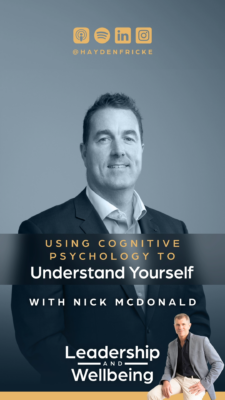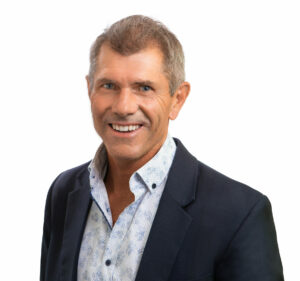Using Cognitive Psychology to Build Self-Belief with Nick McDonald
Recently I was honoured to sit down with Nick McDonald, the CEO of Prestige In-home Care, to discuss the power of using cognitive psychology to develop and enhance self-belief as a leader. Nick Leads a team of 700 people, providing industry leading care services to Australians across New South Wales, Queensland and Victoria, and has over 25 years of experience in the industry. Nick holds a Bachelor of nursing, a Graduate Diploma in Children’s Nursing, and a Master of Business Administration.

In our conversation, Nick shares his personal journey of growth and transformation, highlighting the challenges he faced in growing his business
and the strategies he employed to overcome them. From battling low self-confidence and anxiety to finding balance in his personal and professional life, Nick’s story serves as an inspiration for leaders seeking to enhance their own wellbeing and lead with purpose.
One of the key themes that emerges from Nick’s story is the courage to confront and overcome his self-doubt as a leader of a successful business. Despite his success as a CEO and the growth of his business, Nick initially struggled with a lack of confidence in his abilities. This was fascinating, particularly because Nick is generally a confident person and yet his belief in himself as a leader of a big business was a specific area where he lacked confidence. He shares how his previous career as a nurse made him feel like he wasn’t worthy of his title, despite the company turning over millions.
It is worth pausing to understand a few key terms here. I often like to think of three or four elements in this ‘confidence’ equation. At a high level,we have the concept of ‘self-worth’. This is a more general belief that you are a good person. It is about whether you value yourself. That is, do you believe you are worthy as a human being? This is similar to the concept of ‘self-esteem’, which is the ability to succeed and thrive in life normally. It is how you feel about yourself generally. This is different from ‘self-confidence’, which is a general belief in your abilities and skills. A narrower concept is known as self-efficacy (a concept discussed by Albert Bandura in his book Self-Efficacy: The Exercise in Control) which is the belief in your capability to perform a specific task such as playing tennis. Moreover, it is the belief that you have the capacity and skills to achieve a particular goal. With this understanding, Nick’s issues related a little bit to his confidence and more about his self-efficacy in relation to being a leader of a business. This lower level of self-efficacy no doubt related to his view of himself as a nurse who happened to be successful at establishing and running a multi-million-dollar company.
As a client of mine engaging in coaching strategies, Nick was able to challenge these limiting beliefs and recognise his own value as a leader. We discuss his transformation from feeling deeply inadequate to being confident in the value has to offer in episode 9 of the Leadership & Wellbeing Podcast.
One crucial element that supported Nick’s journey towards self-belief, confidence, and efficacy were the principles of cognitive psychology. By understanding the connection between thoughts and emotions, we’re able to reframe our mindset, rewire our brains and cultivate a more positive outlook. A widely used framework within cognitive psychology originated from Albert Ellis in the mid-1950s is known as Rational Emotive Therapy. Essentially this form of therapy posits that the way we feel (e.g. anxious) is mostly influenced by the way we think. If we want to feel better, instead of trying to change the situation, we need to learn to modify our thoughts about the circumstances. For example, if we are feeling anxious just prior to public speaking, we need to understand that it is not the public speaking event that is causing our anxiety but rather our thoughts about this that cause the emotional response. This could be thoughts like “what if I forget what to say? Or what if they don’t like me? Or I’m not interesting and I’ve got nothing of significance to say”. This type of self-talk can create unnecessary anxiety. Cognitive psychology approaches typically help people to change the unhelpful thoughts that we all have. Another form of cognitive psychology is known as Acceptance and Commitment Therapy (ACT). Essentially ACT doesn’t aim to change your thinking but rather to be more aware of your thoughts and let go of the unhelpful ones. Nick successfully challenged his negative thoughts and moved through the anxiety he suffered.
Coming to a point in his life where he struggled to be mentally or emotionally present with his children, Nick recognised the need to balance his professional responsibilities with his personal wellbeing and family life. He shared the strategies he implemented, including setting boundaries with work, turning off his phone during family time, and engaging in activities that brought him joy and relaxation. We used a framework by Meijman and Mulder (1998) known as the ‘Effort Recovery’ model to help Nick think about the areas where he could focus on to recover from his intense periods of effort on a daily and weekly basis. He learned that finding ways to psychologically detach from work is a crucial aspect to emotional recovery daily. Also, participating in activities that provide you with a sense of mastery and engagement helps to recover because these activities mean that you are not thinking about any of your worries from the day. Furthermore, finding ways to relax in the evenings and throughout the day helps us to recharge our batteries to sustain higher levels of performance. This could include meditation techniques or simply listening to relaxing music whilst lying on the couch.
Nick’s humility, willingness to be vulnerable and desire to open himself up to learning to be a better business leader and to enhance his own wellbeing is truly inspiring for those wanting to find balance and wellbeing in their life and work. His success as a high performing leader is testament to his courage in facing the various and inevitable roadblocks of life.
Listen to the full podcast: https://haydenfricke.com/leadership-and-wellbeing-podcast/
Connect with Hayden:
Websites:
– https://haydenfricke.com/
– https://www.steople.com.au/
– APS College of Organisational Psychologists

